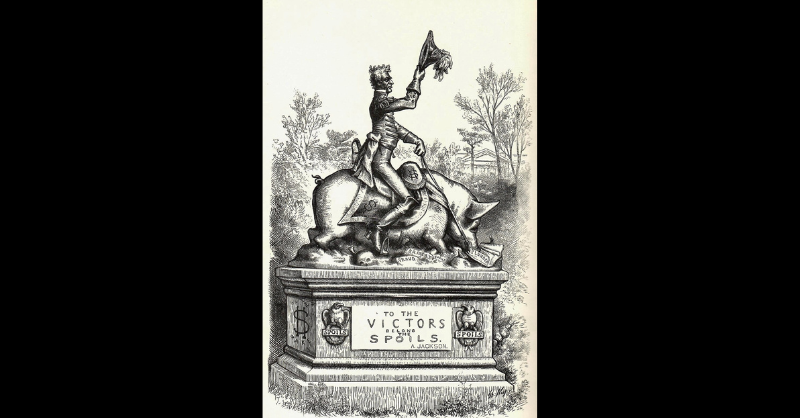


In only a few weeks’ time, the Department of Government Efficiency (DOGE) has uncovered truly outrageous misuse of taxpayer funds. From subsidizing electric vehicles in Vietnam to commissioning a “transgender comic book” in Peru to bankrolling infrastructure projects in Egypt, the career bureaucrats over at USAID have gone on quite the bender with taxpayer dollars over the years. But this prodigal spending only represents the tip of the iceberg.
The transgressions against the American people don’t stop with merely using their hard-earned money to enrich their NGO allies and spread the gospel of wokeism to the four corners of the Earth under the guise of life-saving aid. They extend to siphoning public money to their allies, mounting multiple systematic campaigns of intimidation and censorship against conservatives for expressing their political beliefs, meddling in congressional legislation, and trying to utterly destroy a sitting president.
When they’re not busy squandering our tax dollars, they’re failing at their basic duties. Look no further than the federal response to Hurricane Helene last year or to the East Palestine train derailment in 2023. None of our governmental agencies work better now than they did 10 years ago, except perhaps in facilitating corruption. Few, if any, of the guilty officials ever face consequences for their betrayals of this nation. In fact, they’re often rewarded.
The modern administrative state has become so corrupt and unaccountable to the people that it makes the patronage system (otherwise known as the spoils system) that characterized 19th-century American politics look good by comparison.
A patronage system developed quickly in the new United States after the first two political coalitions, the Federalists and the Democratic-Republicans, formed, but it didn’t come to dominate American politics until the presidency of Andrew Jackson. Jackson gave out many federal jobs to his political allies and people who had stumped for him on the campaign trail in the election of 1828. In a single year, he fired over 400 postmasters in order to give their jobs to his supporters.
Succeeding presidents adopted Jackson’s strategy, rewarding loyal supporters and enthusiastic campaigners with lucrative government posts, and the patronage system became ubiquitous in American political life. In addition to the judiciary, the president primarily appointed ambassadors, postmasters, and customs officials — all lucrative and desirable positions.
Politicians at the time recognized the patronage system as a potentially transformative force in American politics. Southern Democrats feared a Republican victory in the presidential election of 1860 in part because they knew Abraham Lincoln would have the power to appoint Republican federal officials in the South who would then disseminate anti-slavery ideas among the Southern populace, thereby undermining slaveholders’ control.
Calls for reform began to pick up steam after the Civil War and during the infamously corrupt administration of Ulysses S. Grant. Efforts to reform the civil service came to a head after Charles Guiteau, a man who had campaigned for then-candidate James Garfield but felt spurned when he failed to receive a government job in return, assassinated President Garfield in 1881. The subsequent Pendleton Civil Service Act, passed in 1883, introduced major changes to how the federal bureaucracy functioned. First, it required that some government jobs had to be awarded based on merit and introduced competitive exams for would-be government employees. Second, it forbade firing or demoting a federal employee covered by the law for political reasons. Finally, it created the Civil Service Commission to oversee and enforce the act.
That second provision of the Pendleton Act, making it illegal to fire a federal employee covered by the law for political reasons, introduces some major problems. At the time of the law’s passage, its provisions only covered about 10 percent of federal employees. Today, more than 90 percent of federal workers fall under the jurisdiction of the Pendleton Act.
That means a conservative president can’t clear out obviously leftist operatives in the federal bureaucracy just because they’re fanatically opposed to his agenda. Instead, he has to get creative, with things like buyouts and DOGE’s audits.
The patronage system no doubt resulted in egregious instances of public corruption, nepotism, and shady backroom deals. But it nevertheless had a few advantages over today’s administrative state.
The corruption present in the patronage system did not, unlike today’s bureaucracy, go international with its malfeasance, largely due to how the system worked and the country’s noninterventionist foreign policy.
Additionally, unless one political party dominates the presidency, the spoils system ensures that the bureaucracy does not become ideologically entrenched. It also allows the president to more directly influence the chain of command within the executive branch. We’ve seen how monumentally important presidential appointments can be in the federal judiciary. When a new president comes in, he staffs positions with his own allies, which then decreases the likelihood that the bureaucracy will attempt to backstab him or attempt to hamper his agenda.
The president, as the head of the executive branch, should have the power to staff that branch with people he knows will not actively work against his policies, and by extension the mandate given to him by the American people.
Sen. William Marcy, D-N.Y., was correct when he defended Jackson’s appointment of his allies to government jobs in 1832: “To The victor belong the spoils.” Elections have consequences, and one of the consequences of the 2024 election should be an ideological turnover within the administrative state.
The Trump administration and DOGE have started to bring some semblance of accountability to the out-of-control federal agencies, but the rot goes deep and requires a total revolution in the staffing and administration of federal institutions. Without one, the specter of sabotage will haunt Trump’s second term just like it did his first.
The sheer hubris, corruption, and incompetence of today’s federal institutions manage to make the patronage system look like a model of government accountability — a sad indictment of how far we’ve allowed our system of government to fall.
